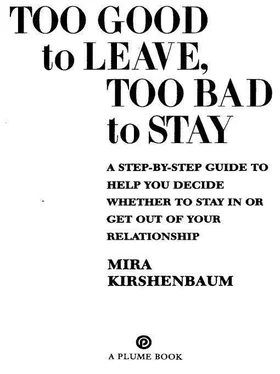Kirshenbaum, Mira - Too Good to Leave, Too Bad to Stay
Здесь есть возможность читать онлайн «Kirshenbaum, Mira - Too Good to Leave, Too Bad to Stay» весь текст электронной книги совершенно бесплатно (целиком полную версию без сокращений). В некоторых случаях можно слушать аудио, скачать через торрент в формате fb2 и присутствует краткое содержание. Жанр: Психология. Описание произведения, (предисловие) а так же отзывы посетителей доступны на портале библиотеки ЛибКат.
- Название:Too Good to Leave, Too Bad to Stay
- Автор:
- Жанр:
- Год:неизвестен
- ISBN:нет данных
- Рейтинг книги:3 / 5. Голосов: 1
-
Избранное:Добавить в избранное
- Отзывы:
-
Ваша оценка:
- 60
- 1
- 2
- 3
- 4
- 5
Too Good to Leave, Too Bad to Stay: краткое содержание, описание и аннотация
Предлагаем к чтению аннотацию, описание, краткое содержание или предисловие (зависит от того, что написал сам автор книги «Too Good to Leave, Too Bad to Stay»). Если вы не нашли необходимую информацию о книге — напишите в комментариях, мы постараемся отыскать её.
Too Good to Leave, Too Bad to Stay — читать онлайн бесплатно полную книгу (весь текст) целиком
Ниже представлен текст книги, разбитый по страницам. Система сохранения места последней прочитанной страницы, позволяет с удобством читать онлайн бесплатно книгу «Too Good to Leave, Too Bad to Stay», без необходимости каждый раз заново искать на чём Вы остановились. Поставьте закладку, и сможете в любой момент перейти на страницу, на которой закончили чтение.
Интервал:
Закладка:
This guideline does not apply if you’re simply one of those people who aren’t quite so comfortable with intimacy as other people. Not everyone has to like getting real close. But there is a big difference between preferring a slightly greater distance and fearing (based on experience with this person) that you’ll get hurt if you get close.
Holding on to Anger
There’s a special case of this that I need to single out. It’s when your partner or you hold on to anger and resentment between fights. Then when you relax and get close the anger that had been held back pours out. That could be because with relaxation you lost your tight grip on your anger or because getting close to your partner again restimulated whatever it was that made you angry in the first place.
There’s a big difference between someone who seems to purposely store up his anger so he can hit you with it when you get close and someone who doesn’t want to be doing this. The difference lies in your partner’s willingness to learn and willingness to do something about it. Going back to what we talked about in the “All the Things You Are” chapter, if he’s not willing to acknowledge his holding-on-to-anger problem and work on it, and if his saving up his anger makes being close unsafe and impossible for you, I’d feel comfortable saying guideline #32 applies.
STEP #33: LOOKING FOR INTIMACY
Now let’s move on to the next step. I’ve just talked about where to draw the line when intimacy hurts. Now I’m going to talk about where to draw the line when intimacy doesn’t happen. It’s not that anything bad happens when you get close, it’s that you don’t get close.
Let me tell you where I’m coming from in my approach to this crucial issue. On the one hand, I know how incredibly important intimacy is to you. On some level intimacy is the big prize in our relationships. We feel happy and successful when we’re close; unhappy and unsuccessful when we’re not.
On the other hand, I know how tricky intimacy can be. I know there’s no anguish like seeking all intimacy that’s forever one step beyond your reach. We have as much trouble finding the intimacy we’re looking for as we do growing a garden that’s not plagued by bugs and weeds and fungus. What’s not intimate enough for you may be far too intimate for your partner. You find it’s very intimate when you do one thing; your partner may find it’s very intimate when you do something completely different.
A very brief, common example. A couple had been in an on-again /off-again relationship for four years. Now they were starting to edge toward a permanent commitment. One huge obstacle was the woman’s unhappiness that her partner wouldn’t say he loved her. For her, intimacy meant hearing those words. The thought of a lifetime without hearing those words was like the thought of an emotional desert.
But from his point of view the words “I love you” were mechanical and perfunctory. They devalued his true feelings, he said. From his point of view he was being more intimate by not saying those words than by saying them. For him the thought of a lifetime uttering perfunctory sentiments was like the thought of an emotional desert.
Both people were being honest. Where do you draw the line? I suggest you ask yourself this question:
Diagnostic question #33. When the subject of intimacy comes up between you and your partner, is there generally a battle over what intimacy is and how to get it?
The mistake people make about intimacy is thinking that their partner doesn’t want it. But people almost never say they don’t want intimacy. In fact, whenever I’ve worked with couples and one of the people in the relationship seems uncomfortable with intimacy or afraid of it, I’m generally hopeful. It may be that they’ve been hurt in the past, or that they just grew up in a family where they never saw much intimacy, or that they’re just not good at it. Someone who even goes so far as to say, “I don’t want so much intimacy” (and that doesn’t happen very often), can meet you halfway because you want intimacy.
The problem isn’t when your partner doesn’t want as much intimacy as you do; the problem is when your partner does want it and has a completely different vision of intimacy from yours. We tend to think of the classic intimacy problem as between a woman and a not-in-touch-with-his-feelings kind of guy. But let me tell you about the worst intimacy problem I ever saw between two people.
Terri and Flo
A lesbian couple, Terri and Flo, were both very comfortable with the idea of intimacy. What’s more, they both were therapists and had experienced and promulgated intimacy every day in their clinical work. The problem was how deeply dug in they were with their opposing visions of intimacy.
For Terri, the height of intimacy was revealing the deepest, darkest secrets and emotions. For her, you were intimate when you cried together, when you talked about the things you were afraid of, when you showed yourself as wounded and woundable. You were intimate when you told someone something you would never tell anyone else and when you told it with a depth of feeling you would never let anyone else see. That, for her, was the real thing when it came to intimacy.
For Flo, the height of intimacy was strolling through the streets of a city they’d never visited before, somehow vibrating in wordless unison in their response to this experience. Or it was working in the garden together, their activities and sensibilities meshing as they were busy together creating something that they saw in the same way. Or it was any shared activity where they did something together and meshed well as they were doing it and felt the same way about it.
Tragically for them, intimacy for each was specifically not what it was for the other. Flo, for whom intimacy was doing things together, saw Terri’s emotional kind of intimacy as a painful waste of time, as making their relationship feel like work. Terri, for whom intimacy was deep emotional sharing, saw Flo’s vision of intimacy through joint activity as anti-intimacy—as the kind of thing you do to avoid being close to someone.
Terri and Flo were as motivated and skilled as any two people could be when it came to “working on” their relationship. In the end, though, they were content to end their relationship because they couldn’t bridge the difference between them over the meaning of intimacy. Every time I’ve seen people driven out of their relationship because of intimacy problems and happy they got out, it was because of this kind of situation, where there are incompatible visions of intimacy that the two people battled over.
Here’s the guideline:
GUIDELINE #33
If you and your partner cannot agree about what intimacy is for the two of you and how to get it, and if holding on to your positions is more important to you than bridging your differences, then most people in your situation end up not being happy they stayed in the relationship and end up happy they left. Quick take: If getting close drives you apart, you can never get close.
You can test for this. A partner who’s had trouble getting close to you because of his upbringing or whatever can still say, “I understand that what it means to you for us to get close is [whatever it happens to be for you], and I’m willing to do what I can, or at least a better job than I have been, in helping us get close in that way.” Maybe you’re still far apart, but slowly that distance can shrink and you can have the experience of that distance shrinking. But when you have strongly opposing visions of intimacy, the last thing your partner wants is to understand what it means for you to get close, because from his point of view your vision is a mistake, a danger even.
Читать дальшеИнтервал:
Закладка:
Похожие книги на «Too Good to Leave, Too Bad to Stay»
Представляем Вашему вниманию похожие книги на «Too Good to Leave, Too Bad to Stay» списком для выбора. Мы отобрали схожую по названию и смыслу литературу в надежде предоставить читателям больше вариантов отыскать новые, интересные, ещё непрочитанные произведения.
Обсуждение, отзывы о книге «Too Good to Leave, Too Bad to Stay» и просто собственные мнения читателей. Оставьте ваши комментарии, напишите, что Вы думаете о произведении, его смысле или главных героях. Укажите что конкретно понравилось, а что нет, и почему Вы так считаете.












